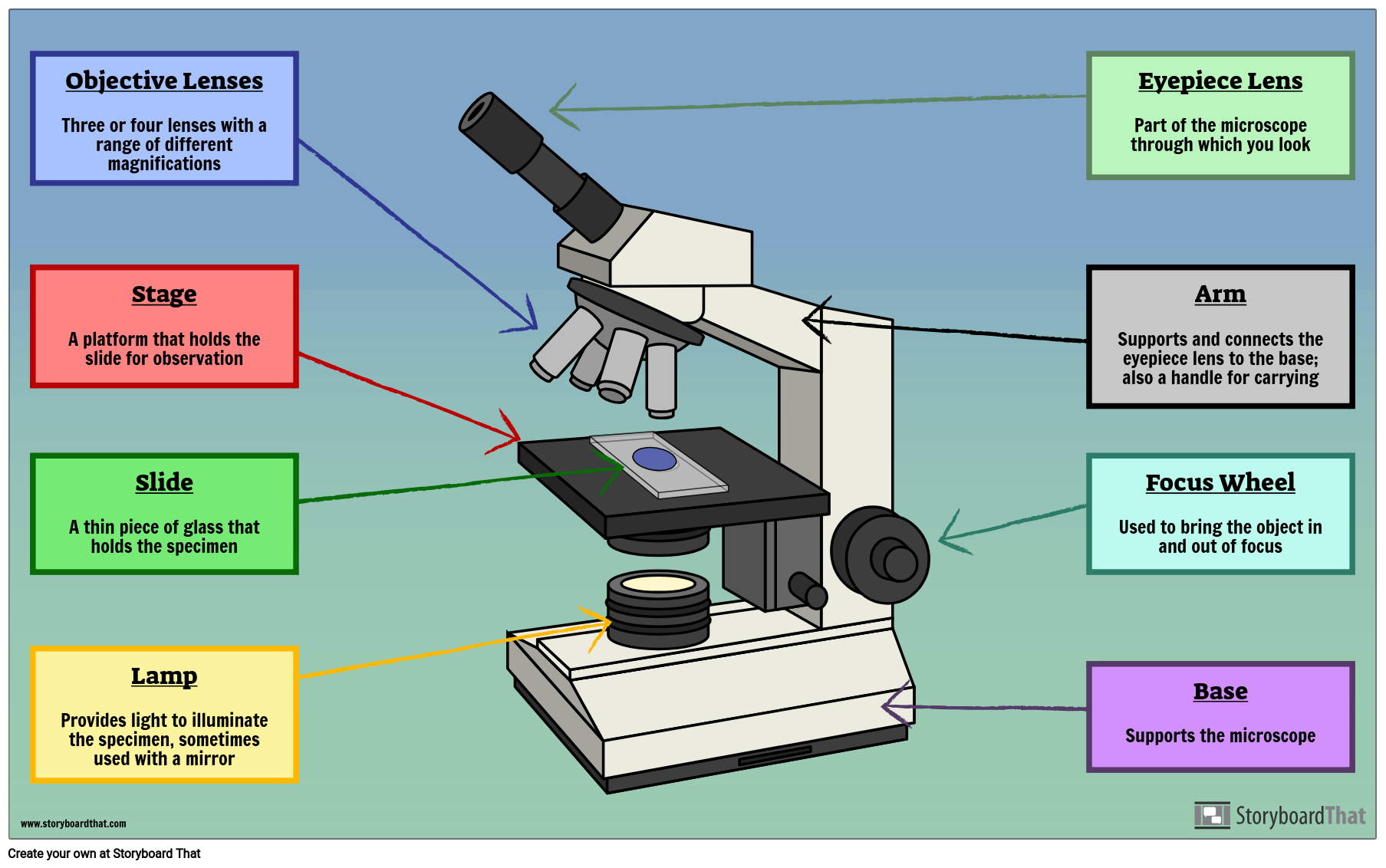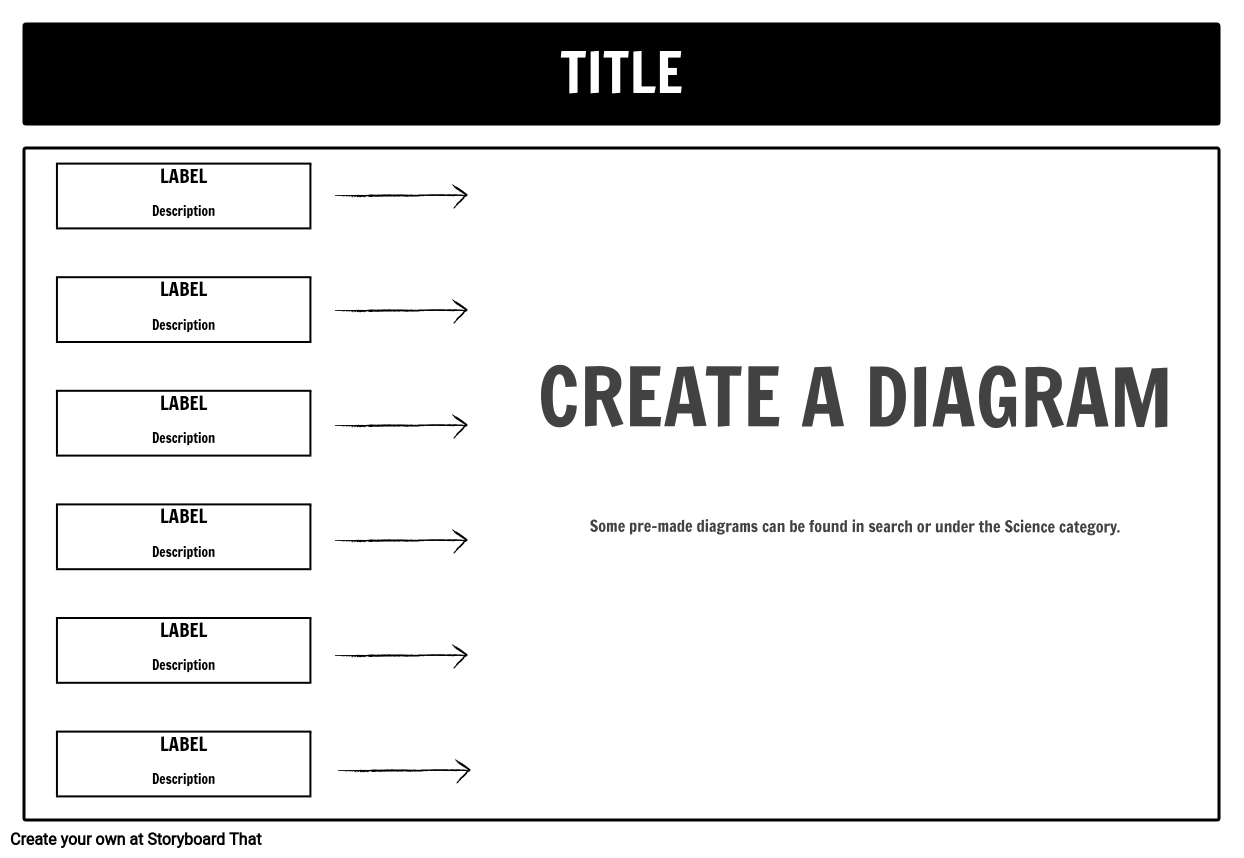Activity Overview
Microscopes are an essential tool to use when studying cells. They allow us to see things that we wouldn’t be able to see with the naked eye. In order to study cells in detail, it's important that students learn how to use a microscope. Before using microscopes in the classroom, they should understand the names and function of each part. In this activity, students will create a poster of a microscope with labeled parts. Students will identify and describe the microscope parts and functions. This is an awesome activity to complete at the beginning of either the school year or the unit on basic cells.
Parts of the Microscope
| Part | Description |
|---|---|
| Eyepiece Lens | The part of the microscope where you look through |
| Arm | Supports the eyepiece lens and connects it to the base (also a handle for carrying) |
| Objective Lenses | Three or four lenses with a range of different magnifications |
| Stage | A platform which holds the slide for observation |
| Slide | A thin piece of glass that holds the specimen |
| Focus Wheel | Used to bring the object in and out of focus |
| Lamp | Provides light to illuminate the specimen, sometimes a mirror is also used |
| Base | Supports the microscope |
In addition to optical microscopes, you can also run an activity looking at electron microscopes, which allow scientists to see things that are much smaller and in much greater resolution than optical microscopes. As an extension of this parts of a microscope labeling activity, have your students create a narrative storyboard on how to correctly prepare and observe cells using a microscope.
Template and Class Instructions
(These instructions are completely customizable. After clicking "Copy Activity", update the instructions on the Edit Tab of the assignment.)
Student Instructions
In order to carry out an investigation to show that living things are made of cells you need to be able to use a microscope. Knowing the names of the different parts of the microscope is essential to be able to use one properly. Create a poster that labels the parts of a microscope and includes descriptions of what each part does.
- Click "Start Assignment".
- Use a landscape poster layout (large or small).
- Search for a diagram of a microscope.
- Using arrows and textables label each part of the microscope and describe its function.
Lesson Plan Reference
Rubric
(You can also create your own on Quick Rubric.)
| Proficient | Emerging | Beginning | |
|---|---|---|---|
| Labels | All the labels are correct. | Most of the labels are correct. | Some of the labels are correct. |
| Functions | All the functions are correct with no grammar or spelling mistakes. | Most of the functions are correct with some grammar and spelling mistakes. | Some of the functions are correct with many grammar and spelling mistakes. |
| Evidence of Effort | Work is well written and carefully thought out. | Work shows some evidence of effort. | Work shows little evidence of any effort. |
Activity Overview
Microscopes are an essential tool to use when studying cells. They allow us to see things that we wouldn’t be able to see with the naked eye. In order to study cells in detail, it's important that students learn how to use a microscope. Before using microscopes in the classroom, they should understand the names and function of each part. In this activity, students will create a poster of a microscope with labeled parts. Students will identify and describe the microscope parts and functions. This is an awesome activity to complete at the beginning of either the school year or the unit on basic cells.
Parts of the Microscope
| Part | Description |
|---|---|
| Eyepiece Lens | The part of the microscope where you look through |
| Arm | Supports the eyepiece lens and connects it to the base (also a handle for carrying) |
| Objective Lenses | Three or four lenses with a range of different magnifications |
| Stage | A platform which holds the slide for observation |
| Slide | A thin piece of glass that holds the specimen |
| Focus Wheel | Used to bring the object in and out of focus |
| Lamp | Provides light to illuminate the specimen, sometimes a mirror is also used |
| Base | Supports the microscope |
In addition to optical microscopes, you can also run an activity looking at electron microscopes, which allow scientists to see things that are much smaller and in much greater resolution than optical microscopes. As an extension of this parts of a microscope labeling activity, have your students create a narrative storyboard on how to correctly prepare and observe cells using a microscope.
Template and Class Instructions
(These instructions are completely customizable. After clicking "Copy Activity", update the instructions on the Edit Tab of the assignment.)
Student Instructions
In order to carry out an investigation to show that living things are made of cells you need to be able to use a microscope. Knowing the names of the different parts of the microscope is essential to be able to use one properly. Create a poster that labels the parts of a microscope and includes descriptions of what each part does.
- Click "Start Assignment".
- Use a landscape poster layout (large or small).
- Search for a diagram of a microscope.
- Using arrows and textables label each part of the microscope and describe its function.
Lesson Plan Reference
Rubric
(You can also create your own on Quick Rubric.)
| Proficient | Emerging | Beginning | |
|---|---|---|---|
| Labels | All the labels are correct. | Most of the labels are correct. | Some of the labels are correct. |
| Functions | All the functions are correct with no grammar or spelling mistakes. | Most of the functions are correct with some grammar and spelling mistakes. | Some of the functions are correct with many grammar and spelling mistakes. |
| Evidence of Effort | Work is well written and carefully thought out. | Work shows some evidence of effort. | Work shows little evidence of any effort. |
How to Use Labeling a Microscope as a Gateway to Microbiology
Introduce the Microscope and its Importance in Microbiology
Start with a basic introduction to microscopes, highlighting their significance in microbiology. Explain how microscopes allow scientists to observe organisms and structures that are too small to be seen with the naked eye. Use visuals and simple explanations to illustrate the types of microorganisms (like bacteria, viruses, and fungi) that can be studied with a microscope.
Hands-On Activity to Label Microscope Parts
Conduct a hands-on activity where students label the parts of a microscope. Provide them with diagrams or actual microscopes, and guide them through the function of each part, such as the lens, eyepiece, and stage. This foundational knowledge is crucial for understanding how microscopes are used in microbiological studies.
Demonstrate Microscope Usage with Prepared Slides
Once students are familiar with the parts of the microscope, demonstrate its usage using prepared slides. These slides can contain simple microorganisms, such as pond water samples or cheek cells. Show students how to adjust the microscope to view these samples and discuss what they observe. This step bridges the gap between theoretical knowledge and practical application.
Introduction to Microbiology Concepts
Transition from the practical microscope activity to an introductory lesson on microbiology. Discuss the types of organisms typically studied in microbiology, their roles in the environment, and their importance to human health. Encourage students to ask questions and express their curiosity about microscopic life forms.
Frequently Asked Questions about Labeling a Microscope
What are the microscope labeled parts?
The different parts of the microscope include: eyepiece lens, arm, objective lenses, stage, slide, focus wheel, lamp, and the base.
What is the microscope function?
The function of a microscope is to examine and analyze small objects and organisms up close and in great detail. Using a microscope diagram labeled, students will better understand how each part of the microscope works.
More Storyboard That Activities
Basic Cells
Pricing for Schools & Districts
© 2024 - Clever Prototypes, LLC - All rights reserved.
StoryboardThat is a trademark of Clever Prototypes, LLC, and Registered in U.S. Patent and Trademark Office









